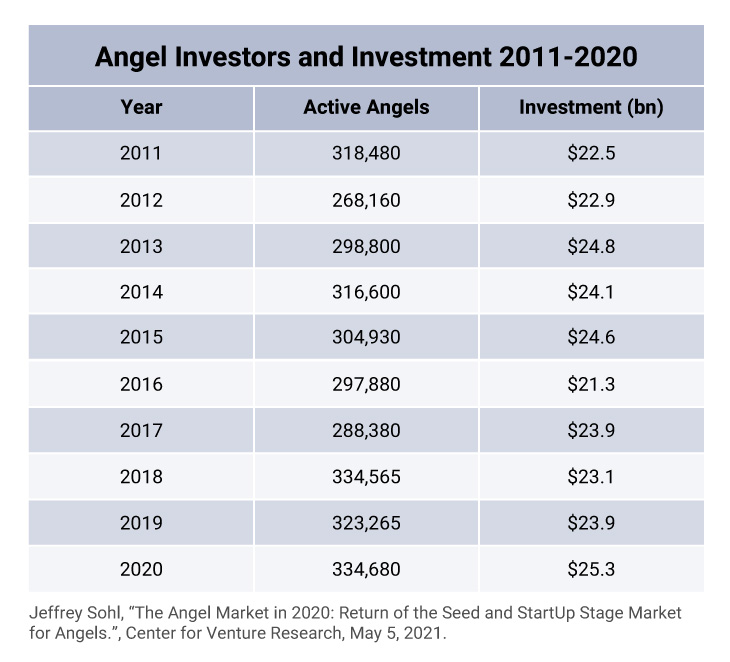Here’s What Five Angel Investors Said They Look For in a Startup
Angel investing continues to power America’s upstart sector. In 2020, over 64,000 business ventures received around $25 billion in funding from more than 300,000 angel investors. Who are these “angels,” and why were they prepared to invest so much money in projects that, in many instances, were simply plans on paper? The reason is simple. Angels invest in bright ideas, but they also invest in people. Angels like an entrepreneur who displays honesty, courage, and determination. Sound like your startup? We examine some of the characteristics that angels want to see.

Angels Do Exist
Anyone who doubts that angels exist should visit Wellfound (Formerly AngelList), the Angel Capital Association, or Eqvista. After a trip to any of these destinations, they’re likely to become true believers, for angels populate these portals in droves — to the delight of many budding entrepreneurs. “Angels” or “angel investors” are typically wealthy individuals who are willing to invest in a business venture because they identify with what the company is aiming to achieve and are excited about it. Tom McKaskill, author of “An Introduction to Angel Investing,” says that “Angels get involved mainly because they enjoy helping early stage businesses, mentoring young entrepreneurs, and participating in the development of an emerging business.”
Angels got their title during the Roaring Twenties for investing in stage productions. The honorific marked their generosity, although wags of the era suggested it was because such investors would leave for the next world before ever getting their money back. But many angels do get their money back. Angel investing is risky, but it can also be highly rewarding. One study found that “the average return of angel investments … is 2.6 times the investment in 3.5 years—approximately 27 percent Internal Rate of Return (IRR).”
Angels are not to be confused with retail investors who contribute capital through crowdfunding. An angel must be an accredited investor; that is, someone who:
- Earned annual income of at least $200,000 (or $300,000 together with a spouse) in the past two years and expects the same in the current year, or
- Has a net worth of at least $1 million, excluding the value of their primary residence, or
- Holds a Series 7, 65, or 82 license that is in good standing.
Angel Investment: Capital and Connections
The angel investment sector is where new companies are born and nurtured. Like the wider private equity market of which it is part, angels contribute much-needed capital to fledgling enterprises, but angels also proffer counsel, guidance, and connections. Knowing an angel or two can prove useful — even if you don’t need their money — when it’s time to recruit professional managerial talent or to add board members. Shrewd company executives know this. In 1996, one year after its launch, eBay had already become a profitable company that was able to finance growth from internal funding. Yet, the company struck up a relationship with venture capital firm, Benchmark Capital, to attract people with deeper management experience. The association paid off. In 1998, eBay was able to hire Meg Whitman as president and CEO, an appointment that was facilitated by Benchmark executives.
As a result, it is angel investment, to a large extent, that brings about innovation and turns plans into products. One study found that over 90% of angel investment went to seed and early-stage ventures. Nonetheless, the boundary between angel investing and venture capital (VC) is blurring. Angels are, in some instances, investing later than the seed stage, while venture capitalists are investing at an earlier stage
How Did the Pandemic Affect Angel Investing?
Overall, the pandemic appears to have had little adverse effect on angel investing, according to the Angel Capital Association. It did at first. In the first quarter of 2020, the number of deals fell by 25.1%, compared to Q1 2019. As a result, funding dollars declined by 36.2%. The situation worsened in the second quarter of 2020. Compared to Q2 2019, the deal count in Q2 2020 was down 38%, while deal dollars tumbled 58%.
A graphic on page 53 of the Angel Capital Association’s report shows the business sectors that benefited from increased angel interest and investment and those that didn’t.
In the end, however, angels rallied. They came out in record numbers, did more deals, and spent more money, according to the Center for Venture Research at the University of New Hampshire. The number of active investors in 2020 (334,680) — the highest since record-keeping began — represented an increase of 3.5% over 2019. Deal total also climbed by 1.2% compared to 2019, to reach 64,480. The value of those investments was $25.3 billion, 6% more than in 2019. Also, in 2020, the average angel deal created four jobs and was for $392,025, up 4.8% from 2019.

What Are Angels Looking For?
What makes an angel want to invest in your company? Particular angels and networks will have different criteria, depending on their areas of interest and other factors. Before reaching out to an angel investor, it’s crucially important to perform basic research in order to discover if he or she will be a good fit.
Look for an angel that has expertise or experience in your business area. Apart from providing much-needed financial support, an investor can act as a trusted advisor and mentor. Also, an angel who belongs to a network can provide invaluable connections to talent and further sources of capital. It may be tempting to accept a check from someone who’s just contributing funds. But dealing with dumb money can lead to problems. The investor may be nurturing unreasonable expectations that are only revealed after the deal is done, or they may act demandingly. Remember, the angel has become a co-owner of the business.
According to angel networks like Rochester Angel Network that have published their requirements, companies seeking funding typically must be:
- at an early stage,
- have a highly scalable business model,
- high-growth potential (e.g., tens of millions of dollars in revenue or more),
- a national or international customer base,
- a completed business plan,
- a reasonable exit strategy within about four to seven years of investment (i.e., a merger/acquisition or IPO), and
- seeking investment in the $250,000 to $2 million range.
Meet Some Angel Investors
Heini Zachariassen
Some angel investors get as much satisfaction from helping entrepreneurs—many have been or are entrepreneurs themselves—as they do from actually investing. Heini Zachariassen is an exemplar of this class of investors. He has looked at life from both sides now, first as an entrepreneur, then as an angel investor. Zachariassen is the creator of the wine marketplace, Vivino. The Vivino app allows wine aficionados to check the ratings, price, and more about an extensive range of wines. The platform currently has over 50 million users and lists about 14 million wine labels. Zachariassen also founded BullGuard, an antivirus software company.
For founders looking for funds, the personal touch matters.
“Generally, the best way to get in touch with an angel investor is through introduction. But you might not have that network just yet. So the next best thing is to find the people around the angel investors, the people who might not invest, but who will introduce you to people who will invest, says Zachariassen.
He recommends starting out your search for funding on angel investor online platforms, such as AngelList, Investor Hunt, and Twine’s The Investor Mega List. Online platforms will list angels from around the globe. But says Zachariassen, “go local, only in rare cases go global.” He recommends doing an internet search for angel investors in your city or those situated close to your location.
“Angels don’t fly alone,” he continues. “They work with each other. They invest together. They learn from each other. And introduce other potential investments to each other.”
Making contact and being welcomed by one investor typically provides an opening to a network of investors. Zachariassen also suggests going to startup events and meetups, as well as using the group organizing service Meetup. This platform makes it easier to locate a group in your area. Additionally, talk about your project on social media. The more channels you employ to get your message out, the greater your visibility is likely to be. “You don’t know who the people that you know know,” says Zachariassen.
Networking has become easier in the digital age. It’s usually not difficult to see your associates’ contacts. If there’s someone among them you’d like to meet, a mutual contact is one way to get an introduction.
“What do I consider the best way to find an angel investor? Search on LinkedIn. There are a lot of angel investors on LinkedIn. I went three levels out and found 106,000 angel investors.”
The worst ways are to try contacting an angel investor through Facebook, by text, or through a phone call.
“Don’t use these methods unless it’s absolutely necessary.”
About 80% of the angels Zachariassen talked to in an informal survey said no to Facebook.
“Okay ways to contact angels include email and LinkedIn messages. Most angels are okay with people reaching out on those channels. One really great way to tackle an angel is at a conference. Another is an introduction by a trusted intermediary.”
What should you say in that first message?
“Talk about the product,” says Zachariassen. “What’s the problem, how it can be solved, and how your team is uniquely positioned to solve this particular problem.”
But remember, your presentation should be short, precise, and relevant.
Alicia Syrett
“Investors say no because entrepreneurs make rookie mistakes,” says Alicia Syrett, founder and CEO of Pantegrion Capital, an angel investment firm.
“Don’t pitch investors without researching them first. They may not even invest in your industry, your geography, or your stage of growth.”
Additionally, “character matters.” Nobody wants to deal with someone who has a questionable character or is weird in some way.
Marc Andreessen
Marc Andreessen is a well-known figure in the investment world. He led the team that created the first widely-used web browser, Mosaic, went on to found Netscape Communications, and then started the venture capital firm, Andreessen Horowitz.
“Ultimately, the decision [to invest or not invest] is and should be around people. The two things we really zero in on people are courage and genius … [courage is] not giving up in the face of adversity … just being absolutely determined to succeed.”
Of course, being smart and having genius doesn't hurt.
David Rose
David Rose is the founder of New York Angels, an angel investor group. He also heads a venture fund and operates Gust, an online angel investing platform. He says the single most important thing an investor is interested in is you and your team. Given that most angel pitches are about 15 minutes.
”In that time, you should, above all things, convey integrity and demonstrate passion.”
Of course, it’s good if you also have experience in starting or running an enterprise, as well as domain expertise.
He says a presentation must start with an “attention grabber” and keep on raising interest in a logical progression, like a flight of stairs.
“Start by saying what the market is: what’s the problem, what’s the solution. Objective validation is also important. This can take many forms. It could be actual sales, an award, or successful beta testing. Avoid presentation flaws: things the VC knows are not true or won’t understand or that makes them stop and think, or any inconsistencies or errors in the presentation.”
Arve Hanstveit
Arve Hanstveit is a member of the New York Angels. He used to be a securities analyst and portfolio manager at TIAA-Cref and previously held the position of Vice President at ABG Sundal Collier, a Scandinavian investment bank. His investment criteria cover six areas:
- A game-changing technology, product, or service with potential for strong proprietary IP
- A management team that can get it done
- A large, global addressable market
- Low capital intensity
- Strong scalability
- Attractive exit opportunities
“The most important element is the team that’s going to make this happen. I think Warren Buffett had a saying. If mediocre management meets an excellent product in a business, most of the time the management will win. Conversely, an excellent team can do wonders with a mediocre product. The people are really more important than the product and technology itself,” he says.
A good management team should have the following qualities:
- Strong background for the task at hand
- Commitment, both financial and emotional
- Enthusiasm and energy
- Good communication skills
- Cohesiveness and ease of working together
- Willingness to listen and learn
Avoid a Cargo Cult Mentality
One thing to avoid, angels agree on, is a cargo cult mentality; that is, imitating the trappings and rituals of successful companies. Be sure to understand the context and reasons why certain actions were taken.
During WWII, the conflicting sides — Allies and Axis — set up bases on a number of South Sea islands. The islanders became accustomed to seeing cargo planes drop supplies by parachute. After the war, they imitated the soldiers’ activities — marching in parades, flag-raising ceremonies, etc. — convinced that these actions would cause the cargo drops to resume. Naturally, they didn’t. Companies and leaders that blindly imitate others are likely to experience the same disappointment. That’s why angels value uniqueness. The entrepreneur that can be distinctive without being quirky is the one likely to get their nod.
About the Author

Anthony is the owner of Kip Art Gifts, an ecommerce store that specializes in art-inspired jewelry, fashion accessories, and other objects. Previously, he worked as an accountant and financial analyst. He enjoys writing on small business, financial intermediation, and economics. Anthony was educated at Wilson’s School and the London School of Economics and Political Science.
Startup Resources
- Learn more about Startups
- Visit the TRUiC Business Name Generator
- Check out the TRUiC Logo Maker
- Read our Business Formation Services Review
- Find Startup Ideas
- Explore Business Resources
Form Your Startup
Ready to formally establish your startup? Click below to read our review of the best business formation services!
Best Business Formation Services